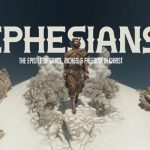Aseity means that God is sufficient for Himself and that He is autonomous to the extent of complete and perfect independence. Aseity is derived from the two Latin words “a se,” which means “from or by oneself.” Aseity is not a word used in the Bible, but the concept is found throughout the Scriptures.
God is the sole cause of creation. He has being in and of Himself and derives His being from no other person. No other person caused Him. This is a hard truth to understand.
You might have heard this conversation of children with their parents, in which they will ask their mother who made them. The mother will reply that God made them, and the child in response will ask who created God.
You might have pondered this question to some extent. Maybe you might have found a satisfying answer for yourself or you are still looking to resolve this great mystery in your mind. Whatever might be the case, I implore you to look through the Scriptures with me and see how God has revealed Himself. Stephen Charnock denoted: “God eternally possessed His own felicity in Himself, and had no need of the existence of anything without Himself for His satisfaction.”
God is Eternal and He lives in eternity. He had no beginning, nor will He have an end. He is not bound by the laws of time, but He rules over time from eternity. His being is from everlasting and will remain to everlasting (Ps. 90:2).
This excellency of God distinguishes Him from the rest of the created order. All of creation has a point of beginning, a time when it was created, but God does not. Time began when God created the universe. Even when there was nothing, God was still fully God and perfect in His being. “Your throne is established from of old; You are from everlasting” (Ps. 93:2).
Consider these verses as well: “The God who made the world and all things in it, since He is Lord of heaven and earth, does not dwell in temples made with hands; nor is He served by human hands, as though He needed anything, since He Himself gives to all people life and breath and all things” (Acts 17:24-25). Paul refers to the Aseity and self-sufficiency of God. He is not in need of worship or praise from man. He gives out of the bounty of His person and graciously beyond measure.
This giving of God does not render Him lacking. “For in six days Yahweh made the heavens and the earth, the sea and all that is in them, and rested on the seventh day; therefore Yahweh blessed the sabbath day and made it holy” (Ex. 20:11). God possesses existence in and of Himself, and He grants existence to all of His creatures. God is the only independent existence, while everything derives its existence from Him. The God of the Bible is not a needy deity, as many preach Him to be.
We need to see God as the Eternal, self-sufficient being that He is. Our presuppositions might differ from the revelation of God. Yet we need to align our thinking with the Scriptures. We have to bow down to God when He proclaims the Eternality of Christ. We have to believe it to be true for all the persons of the Trinity.
The creation did not add anything to His being. God was perfect before the making of the world, and He is the same after the creation of the universe. God is not bound by time and its laws, and that is why Peter can say “But do not let this one fact escape your notice, beloved, that with the Lord one day is like a thousand years, and a thousand years like one day” (2 Pet. 3:8). There is no limit to His lifespan. This is the reason why He seems so foreign to our human experience. In our limited comprehension, we have limited thoughts and put limits on others based on our experiences. But we should not do this to God.
Some people might object and say that the Father is Eternal but that the Son is not. This is unbiblical and even heretical thinking. Jesus Himself says to the Jews “Truly, truly, I say to you, before Abraham was, I am” (John 8:58). When He says this, in the context of the verse, it can be seen that the Jews understood what He meant. They picked up stones to stone Him because they knew that this was a claim to deity.
“I am” reveals that Jesus was, is, and will remain the same. Jesus is referring to the instance in the book of Exodus where God sends Moses to Pharaoh and reveals His character through the burning bush. Jesus therefore reveals in the Gospel of John that He is that same God. No change had been brought in Him due to time because He is a timeless being.
The Eternality and Aseity of God are both great truths that we need to keep in mind as we approach His person. These truths should drive us to worship God as we see Him as the transcendent and glorious being He is and worship Him.






